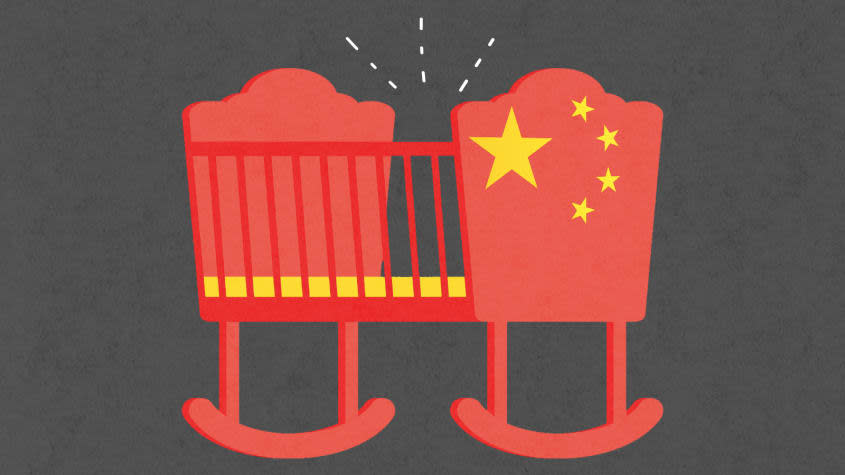What China's decline means for the U.S., Taiwan

There are fewer people in China. The country's population shrank by 850,000 people in 2022, the first time the country has seen a decline since it experienced a devastating famine in the early 1960s. The difference now? China is a rising economic and military power — and its loss of population threatens those accomplishments. The new numbers have prompted fears that the day is coming "when China will not have enough people of working age to fuel its growth," The New York Times reports.
What does this mean for China's future as a superpower? And who might replace China as the world's most populated country? Here's everything you need to know:
Why is China's population decreasing?
There are a number of reasons. Pew Research Center points out that China has long been a place people simply leave. "In 2021, for example, the country experienced an estimated net out-migration of 200,000 people." Of those who stay, the population is disproportionately male: There are approximately 30 million more men than women in the country, and those women are increasingly waiting until later in life to have children. The pandemic may also be playing a role: "Some have cited China's [now-abandoned] zero-COVID policy as a contributing factor to delayed motherhood."
Didn't China actually try to slow its population growth?
Yes. For decades, China famously had a "one-child" policy. "Anxious that rapid population growth would strain the country's welfare systems and state-planned economy, the Chinese state began limiting how many children families could have in the late 1970s," NPR reports. That happened after the country's population nearly doubled between 1940 and 1980, adds the South China Morning Post. The system was enforced with "fines for violators and often forced abortions." That policy led to "sex-selective abortions" that produced the skewed male-to-female ratio. And it also led to plunging numbers of new babies. In response, authorities raised the limit to two children in 2016 — and then to three children in 2021.
Does China no longer have the biggest population, then?
Maybe. Reuters reports that U.N. population experts last year estimated that India's population had grown to 1.412 billion. That would just edge out China, its neighbor. But the numbers are a little fuzzy: Like the United States, India does a census only once a decade — and the 2021 count has been delayed because of the COVID pandemic.
What does a declining population mean for China's future?
It's bad news for the country's growing economy. "China faces a shrinking workforce that will struggle to support a rapidly aging population," The Washington Post reports. According to The New York Times, "By 2035, 400 million people in China are expected to be over 60, accounting for nearly a third of its population."
One model for what happens next is Japan — once considered an economic rival to the United States — where a graying populace has served as a drag on the country's economy. The same could happen in China, CNN reports, and make it difficult to keep the country's already-stumbling economy humming. "The Chinese economy is entering a critical transition phase, no longer able to rely on an abundant, cost-competitive labor force to drive industrialization and growth," one economist told the news network. That could have ripple effects on the global economy.
What does that mean for the budding U.S.-China rivalry?
"Ironically, the population crash is coming just as the People's Republic asserts itself on the world stage like never before," Canada's National Post notes. China's newfound riches have powered a massive expansion of the military and made the country more aggressive and influential abroad. That's led to increasing talk in the United States of "great power competition" and a "pivot to Asia" that has authorities taking action to limit Chinese influence on American social media and industry. But the population decline could undermine China's ascendancy on the world stage. "If you have to spend more than a quarter of GDP to take care of the (aging) population itself, you obviously have less to spend on military, to buy aircraft carriers," the University of North Carolina's Cai Yong tells the National Post. "You cannot project force."
What does this mean for Taiwan?
China considers Taiwan to be a renegade province. There have been growing fears of a possible war that could draw in the United States. The population decline could exacerbate tensions. The RAND Corporation's Timothy Heath writes for Lawfare that China's "compounding troubles" — which include the demographic challenges, but also the pandemic and a troubled property market — could prompt President Xi Jingping to take rash action. "Analysts warn that the situation could motivate China to risk aggressive behavior against Taiwan, disputed islands in the first island chain, and in foreign policy more generally," Heath writes, although he expects that "Beijing's tolerance for risk will likely decline."
What's next?
Bloomberg reports the government has tried to make childbearing easier by lowering educational costs. Beijing has also introduced new rules discouraging abortions. More incentives to encourage couples to have more kids, sooner, are probably on the way. The problem? A population decline, once begun, is difficult to reverse: If "the experience of Japan, South Korea, and other developed nations is any guide, it's incredibly difficult if not impossible to radically raise birth rates." One thing to remember: While China's population is shrinking, it's still plenty big. The number now stands at 1.41 billion people.
You may also like
Why are people angry about the new monument honoring MLK and Coretta Scott King's love story?
Fugees rapper says he will subpoena Obama and Trump to testify on his behalf

